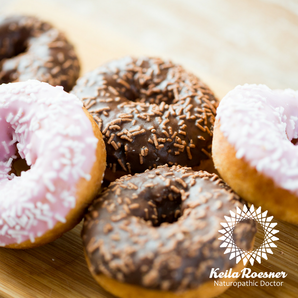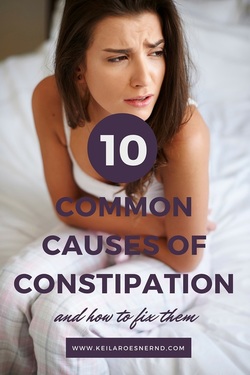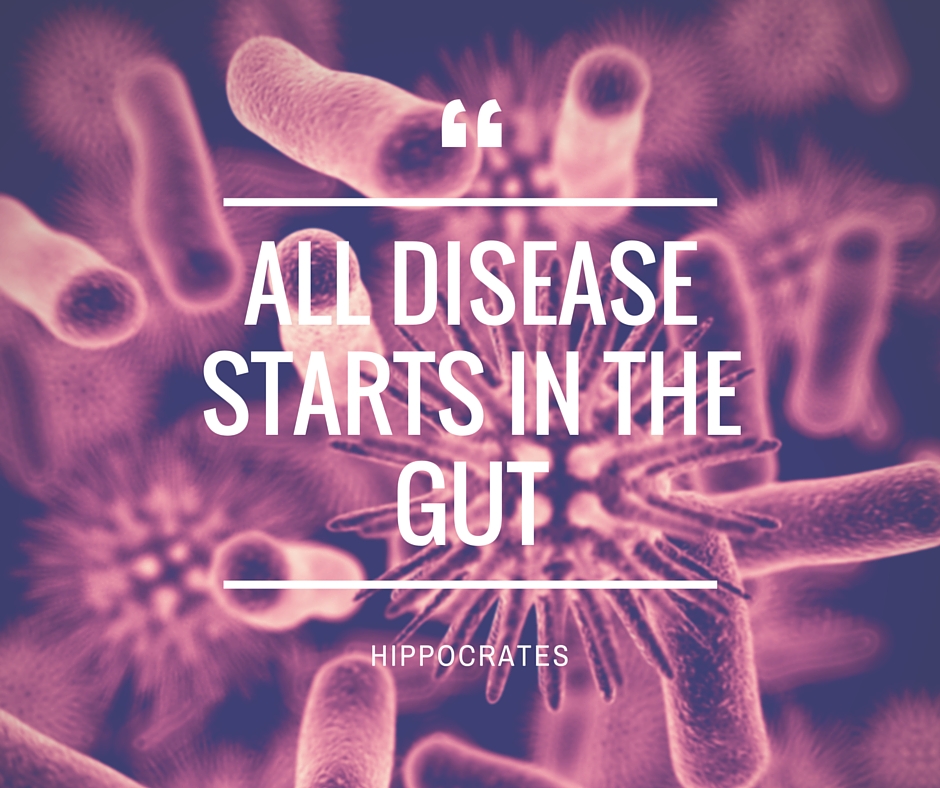 Your body is ALWAYS trying to communicate with you. The problem is that most of us get so busy that we forget how to listen… so our body needs to scream to get us to pay attention. I hear it all the time. “But Dr. Keila, I’m pretty healthy..”! Meanwhile, you may be taking a few prescription medications to control your blood pressure, thyroid and that random rash that comes and goes. TUMS are in your medicine cabinet and you carry Tylenol in your purse all the time. But that’s all normal, right? Nope. Not at all. There is a BIG difference between common and normal. Common is taking a few prescription medications, having digestive issues and bad knees. Normal is having a good night’s rest, waking with energy and not requiring caffeine. Normal is being able to eat food without feeling awful afterwards, and almost never getting heartburn or headaches. Big difference. Sometimes our body needs a reset. To clear the clutter and figure out what actually is going on. Here are 10 major signs your body is not functioning “normally” (even though they may be common!).
A good detox should help you address all of these things. It is not meant to “fix” things, but to help your body reset and tune out some of the noise so that you can actually figure out what the heck is going on. Do any of these sound like you? Comment below! If you are tired of these common, but definitely NOT normal signs, here’s three free you can do:
If you found this article interesting please share. In health,
0 Comments
 What if Irritable Bowel Syndrome (IBS) wasn't "just in your head?". This may seem revolutionary for many physicians... and people that don't have IBS. Anyone living with IBS knows it's true. Nobody wants to be bathroom bound when they try to leave the house, or have to scan a restaurant menu frantically looking for the one item that won't cause them pain or embarrassing gas within an hour. Well, it's true. Small Intestinal Bowel Overgrowth (SIBO) is estimated to be the cause of anywhere from 40-85% or more cases of IBS. Clinically, I would say that this number is even higher. Your Gut is a Garden There are several types of bacteria within the digestive system. The particular species depend on things like your genetics, your birth type (hospital, home birth, vaginal, C-section), breast versus formula feeding, your diet, medications and stress. They can change over time and the unique combination can markedly affect how you feel. It can be helpful to classify human bacteria into three categories:
Much like a garden, there are a combination of plants that you want like tomatoes, sunflowers, parsley (healthy bacteria), species that show up that can take over if not contained like mint, orange lilies (commensals) and then there are invasive weeds like bindweed, thistles (pathogenic bacteria). Every garden will have a combination of all of these. As in the human digestive system, we want the balance to be tipped in favour of the helpful species, so that the neutral species can exist in manageable amounts, and hopefully ultimately crowd out the weeds. A diligent gardener can also go a long way. Normally, the majority of bacteria within the digestive system reside within the large intestine where they work on the food you're digesting to produce Vitamins B1, B2, B6, B12 and K2 as well as other substances. Since we have 10 times as many bacterial cells in our body as we have human cells, even a small alteration in our bacterial garden can change our landscapes dramatically. Our In House Gardener: The Migrating Motor Complex (MMC) The MMC coordinates electrical wave patterns every 90-120 between meals that sweeps through the stomach and small intestine to helps propel food and bacteria from the ileum (the end segment of the small intestine) to the large intestine. In order to function properly, our body needs to have a break between meals. In SIBO, these bacteria can migrate backwards, up into the small intestine which normally has far fewer bacteria. This migration can occur with intestinal permeability, certain medications, inflammatory bowel disease (Ulcerative Colitis, Crohn's Disease), Celiac disease, and low stomach acid. Because competition is less fierce in the small intestine than in the large intestine [Read my previous blog here to review], these bacteria can settle in, replicate and grow without being crowded. This is like freshly tilling your garden and then going on vacation for two weeks only to find that your neighbour's weeds crept under the fence and have taken over. Now you have thistles that are six feet tall. The problem is that now you have bacteria existing in high amounts where they would not normally be and they are now crowding out healthy bacteria, interfering with your crop and attracting pests. The overgrowth can be a combination of healthy, commensal or pathogenic bacteria.... it doesn't really matter because you've got a forest on your hands. This overgrowth is what contributes to much of the discomfort of Irritable Bowel Syndrome. Have you ever noticed that flowers are easily pulled but weeds have deep roots? Same story here. The bacteria that takes hold likes to stick around and make a mess. It can throw off the MMC, and instead of helping to digest your food it ferments it. Fermentation is the process of converting sugars in foods to gases or alcohol, as in beer, wine and sourdough bread. Our bodies are not designed to ferment, and when we do, we bloat. We get gas pains and "I swear I'm not 3 months pregnant!" food babies after eating. Because the food is not breaking down properly, we also get intestinal permeability. We are more likely to have other problems too:
Sound familiar? In our next blog post, we are going to be covering the key signs to watch out for to tell if you have SIBO and what you can do about it. If you found this post helpful, please share with your friends and family! In happy digestive health, Dr. Keila
References
 I had a potential new client in my office today who had been diagnosed by her family doctor with Irritable Bowel Syndrome several years ago. When she asked what she should do next, he told her to "go read about it". Wait, what?! There is so much misinformation online: treatments based on outdated science, "it-worked-for-my-sister's-neighbour" stories and down right bad advice. Unfortunately, she did not have a medical degree or background in research to be able to decipher the good from the bad. She knew that the info she was seeing on Yahoo forums was probably questionable, she didn't know where to go to find good information. So she was referred by her pelvic floor physiotherapist to me. "Reading about it" had done nothing for her and she was sick and tired of daily diarrhea. She is not alone. One of the most common causes of IBS is a little known condition called Small Intestinal Bacterial Overgrowth (SIBO) - [read my previous blog post here]. While you should absolutely work with a knowledgeable health professional, there are several tell tale signs that your IBS is actually due to SIBO (and not a deficiency in "reading about it"). 5 Key Signs You Might Have SIBO:
If any of these sound familiar, let's set up a time to chat. Book your complimentary Health Discovery Session to discuss your options. Getting the right testing is the first step to getting better. The good news is that there are some very good tests you can do to see if SIBO is causing your IBS. Based on your results, we can create a customized plan to get rid of the discomfort, gas, bloating and bathroom embarrassment. Once and for all. In my next blog, we will talk about some of the testing you should have to finally get rid of your Irritable Bowel Syndrome. In health,  Ever had a "Bridesmaid moment"? One of my patients the other day told me about hers. The thing is, she eats exceptionally healthy, exercises, meditates daily and has one of the sunniest outlooks on life I've ever seen. She did not have food poisoning. But her digestive system was a mess. In fact, she had been diagnosed with Irritable Bowel Syndrome (IBS) and her doctor also suspected Irritable Bowel Syndrome is estimated to affect between 10-15% of Canadians (1). I would tend to say that these numbers are extremely conservative because many people with digestive disorders may not seek care from their medical doctors, or it may take several years to receive a diagnosis. In fact, the vast majority of my clients have one or more digestive concerns. If you have one digestive issue you are likely to have another. They are not unrelated. This is not a fluke. And you're not going to fix it unless you treat the whole system, or more practically, treat you as a person rather than a collection of mouths, stomachs, guts and colons. The most common digestive issues that I see and treat are:
Treatment for these concerns may not be particularly helpful and can often cause additional concerns. For example, Proton Pump Inhibitors (PPI) are commonly prescribed to treat heartburn. Side effects of Nexium (Esomeprazole) a common PPI, include constipation, watery diarrhea, abdominal cramps, stomach pain, and nausea (2). Other PPIs may decrease absorption of calcium, magnesium, zinc, iron and vitamin B12, increase risk of Community Acquired Pneumonia, C. difficile infection, Traveler's Diarrhea, and Small Intestinal Bacterial Overgrowth (3). Moreover, these medications work by decreasing acid production within the stomach. While this may alleviate heartburn (read my thoughts on this here), this is like cutting off your nose to spite your face. The thing is, we need lots of stomach acid. The stomach's job is to burn off parasites, molds, bacteria and viruses to help protect our body from infections. Without a strong acid barrier, our body is not going to be able to protect against these nasty things. In particular, heartburn is associated with Small Intestinal Bowel Overgrowth (SIBO) - a condition of inappropriate types of bacteria hanging out in the small intestine where they shouldn't be. This is relevant because SIBO is conservatively estimated to be the direct cause of Irritable Bowel Syndrome in 40-85% of cases. That's right, IBS is not idiopathic or in your head. To add more fuel to the fire, a 2009 study showed that people with GERD were 3.5 x more likely to develop IBS and that people with IBS were 2.8x more likely to develop GERD (4). So, what can we do about it? Treat the Cause. Here are the big priorities.
If you find this article helpful or surprising and would like to learn more, I would love to invite you to book a complimentary Health Discovery Session with me to discuss your options. In happy digestive health, Dr. Keila
References:
 Stopped up. Bunged up. Full of it. Constipated. No fun. Constipation is something I frequently see in practice, and something I notice that tends to effect women, the elderly and people taking more medication more commonly. Increasingly, I am seeing more issues with young women in their teens and twenties. Typical recommendations are to avoid constipation is to increase water and fibre, and to consume more leafy greens (again, more fibre). But what if these things aren't helping... or are making the sh*tty situation worse? Before we get into the why and more importantly, what you can do about it, let's back it up (get it?). You will definitely want to check out my digestion post for more in depth specifics on how the digestive system works. Constipation is defined as infrequent bowel movements that are often difficult to pass and that is lasting a few weeks or more. Many physicians consider constipation to be 3 or less bowel movements per week. On the other hand, Traditional Chinese Medicine and Ayurvedic medicine consider normal frequency to be 1-3 bowel movements per day with any more or less to be abnormal. Normal bowel movements should be easy to pass, solid, medium brown in color, with no undigested bits of food, no blood, no mucous, no straining and with only minimal wiping required. Checking your stool every day is a great way to keep tabs on how things are moving. Constipation can usually be resolved by:
Constipation can also signify:
If you are experiencing frequent or long term constipation, be sure to check with your doctor or Naturopathic Doctor or pelvic floor physiotherapist to rule out the conditions listed above. You can also book a Free 15 Minute Health Discovery Session with me to learn about your options. In health & smooth moves,  "My stomach hurts all the time", lamented my third client. That is, my 3rd client today alone. She continued, "I'm bloated all the time, even with healthy food. I'm constipated, then I have loose stool. I never feel like I'm getting everything out!". I also work with her father, who has heartburn, a "noisy gut" and suffers from urgent abdominal pain any time he has to go outside of the house. 2 out of 3 clients I work with have digestive issues. As long as I can remember, I have had abdominal pain while eating dinner. My immediate family all suffer from Irritable Bowel Syndrome ("Ass Crisis", as we've affectionately deemed it). I have had a vested interest in learning and working with the digestive system from the day I saw my first client. Fortunately, I have found that most "gut problems" respond extremely well to Naturopathic medicine. If you, or someone you love, has been suffering, this post is for you. The Digestive System - more than just your stomach The digestive system encompasses everything from your mouth down until you see it in the toilet (hopefully) the next day. The Head Digestion starts in the brain, evoking a physical response long before food passes your lips. When we think about food, envisioning how it will taste and feel and actually let ourselves feel hungry, our body gets to work increasing saliva, stomach acid and digestive enzymes. Like a good seduction, digestion is as much a head game as the act of doing it. Problem Zone 1: eating mindlessly, not letting yourself get hungry, eating in a rush, over-eating etc. so that your body doesn't have time to catch up The Mouth Chewing your food thoroughly accomplishes two things:
Problem Zone 2: eating without thoroughly chewing, drinking large amounts of fluids with meals that may dilute your digestive enzymes The Esophagus The esophagus is a flexible tube that carries food from your mouth to your stomach. At the bottom of the esophagus/top of the stomach is a muscle called the lower esophageal sphincter or the cardiac sphincter. When it opens it allows food from the esophagus in the stomach, otherwise it should stay shut to prevent splash up of acid causing heartburn. Problem Zone 3: eating too quickly so that food gets stuck or the stomach becomes overloaded; heartburn that creates pain in the esophagus The Stomach In the stomach, hydrochloric acid (HCl) is produced by the parietal cells in the stomach. Another enzyme called pepsin begins to work on the food as well, breaking down protein. An acidic environment is required to breakdown our food and prevent pathogens (bacteria, fungi, parasites and other food borne illnesses) from taking hold. After churning in the stomach, the partially digested food (now called chyme) moves past the pyloric sphincter at the base of the stomach and empties into the upper small intestine. Problem Zone 4: inadequate stomach acid causing poor digestion of food, heartburn and increasing risk of illness, ulcers Liver/Gallbladder/Pancreas As food enters the upper portion of the small intestine, it passes nearby to the liver, gallbladder and pancreas, which all make enzymes to help us digest fats, proteins and carbohydrates (lipase, protease, amylase and others like lactase for digesting lactose, renin, sucrase etc.). This will result in further breakdown of our food. Problem Zone 5: inadequate fat in diet to stimulate production of lipase and bile, not enough protein in diet to make these enzymes, blood sugar issues that compromise the pancreas' ability to manufacture amylase and keep blood sugar in check, poor functioning of the liver and gallbladder The Small Intestine The small intestine has three parts: the duodenum, jejenum and ileum and collectively is about 6 meters (20 feet) long in humans. As it passes through each of these, food interacts with the lining of the intestines, is absorbed and utilized by the rest of the body. Nutrients from our food are absorbed along the small intestine and breakdown continues. Problem Zone 6: food sensitivities create inflammation along the lining of the small intestine resulting in poor digestion and impaired absorption of nutrients. These can create very dramatic digestive symptoms, and malnutrition. Colon Issues The mostly digested food enters the large intestine, where water is reabsorbed back into the body along much of its 1.5 meters (5 feet). Different kinds of bacteria work on breaking down the remnants here. Problem Zone 7: poor bacteria in the colon can cause bloating, gas, distention and pain. Rectal Issues Finally, stool exits the body. Stool is mainly water, combined with food remnants, dead bacteria and cellular waste. If there is inflammation here or in the colon, the remaining material may not be broken down properly. Problem Zone 8: Hemorrhoids and anal fissures (small cracks around the anus) can block the passage of stool and create pain, bleeding and tearing of the delicate tissue. Putting It All Together (The Digestive Dream!): Top 10 Tips to Hack YOUR Digestive System:
If you experience gas, bloating, heartburn, diarrhea, constipation or other digestive concerns and are interested in learning more, please schedule your Free 15 Minute Health Discovery Session with me. In health & happy digestion, |
Top 75 Naturopath Blogs & Websites For Naturopathic DoctorsAuthorDr. Keila Roesner is a Naturopathic Doctor. When not treating patients she is also an enthusiastic barefoot-strolling, music-loving, yoga-doing kitchen wiz - who also happens to be a wrestling fan. Categories
All
|
Let us take you from hormonal to whole.
|
Dr. Keila Roesner, BHSc ND
Naturopathic Doctor, Hormone Warrior and Your Wellness Cheerleader 247 Church Street, Stratford ON N5A 2R7 (519) 273-0900 [email protected] |
|









 RSS Feed
RSS Feed